Module 9 Unit 1 Will computers be used more than books in the future?课件(共39张PPT)
文档属性
| 名称 | Module 9 Unit 1 Will computers be used more than books in the future?课件(共39张PPT) |
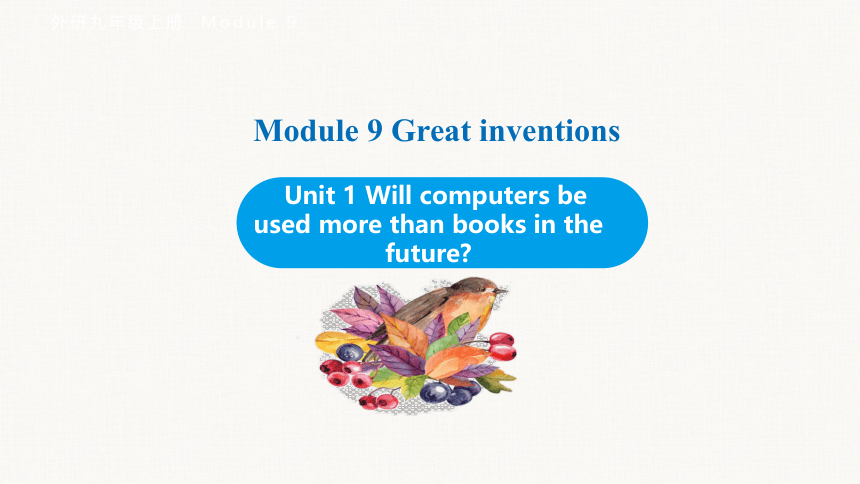
|
|
| 格式 | pptx | ||
| 文件大小 | 12.1MB | ||
| 资源类型 | 教案 | ||
| 版本资源 | 外研版 | ||
| 科目 | 英语 | ||
| 更新时间 | 2024-05-14 14:24:37 | ||
图片预览

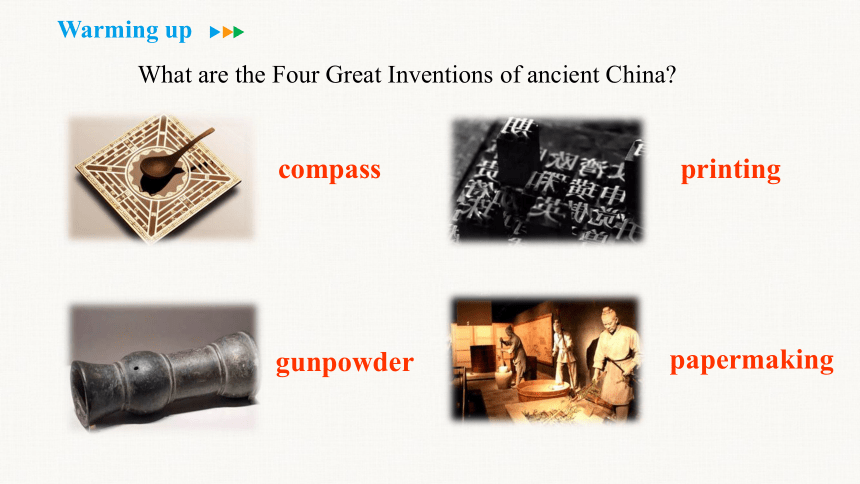

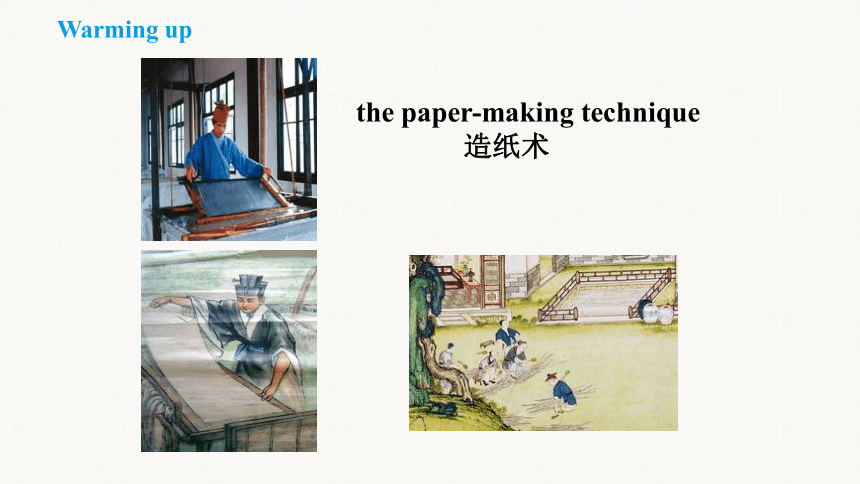
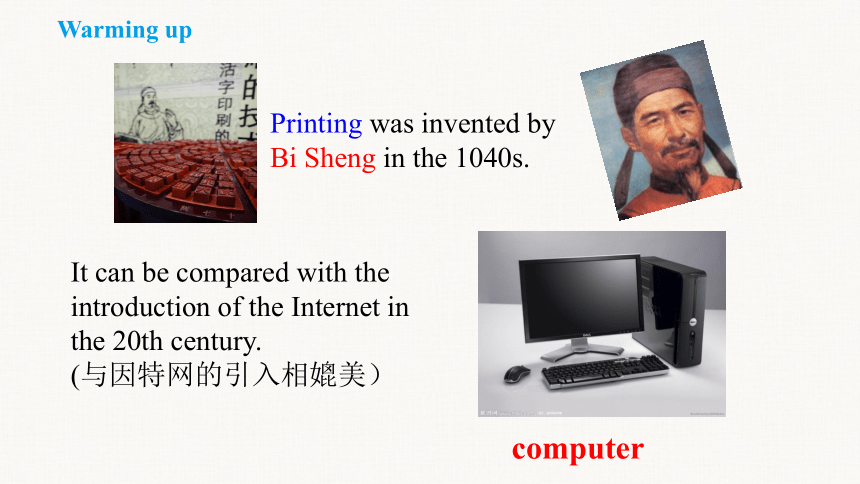
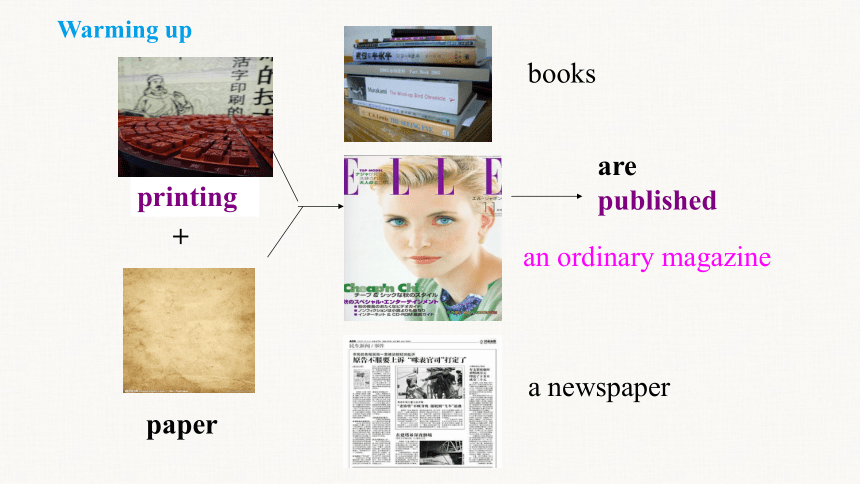
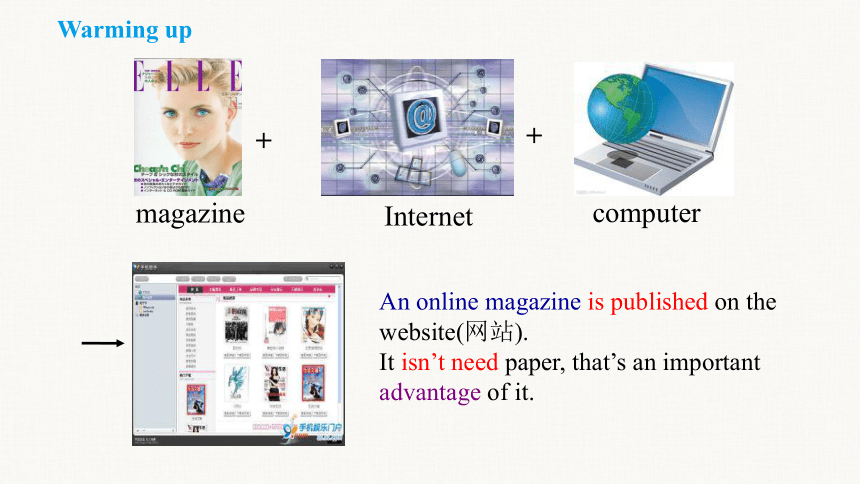

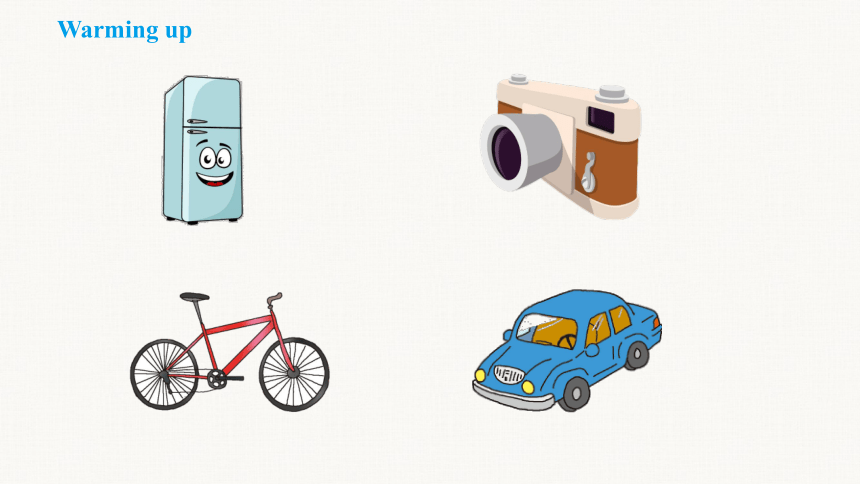
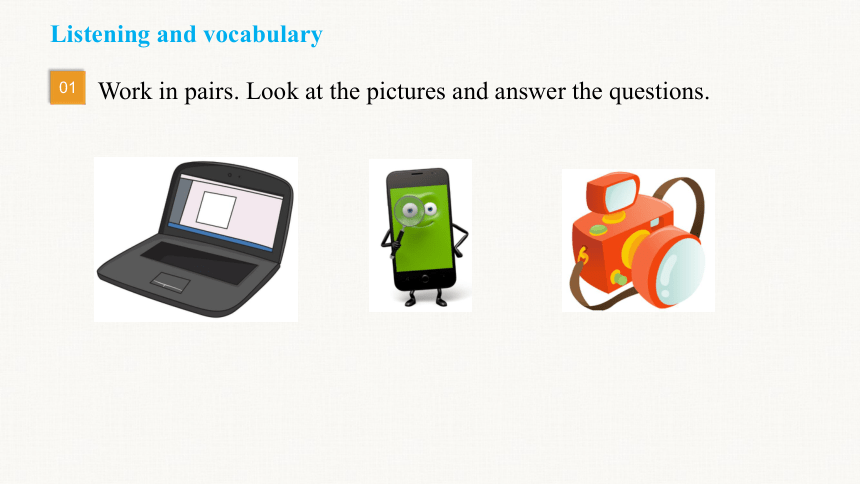
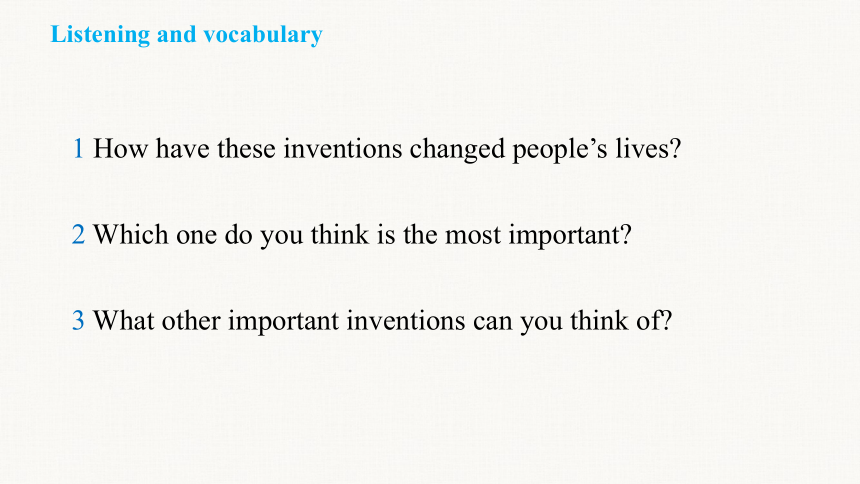
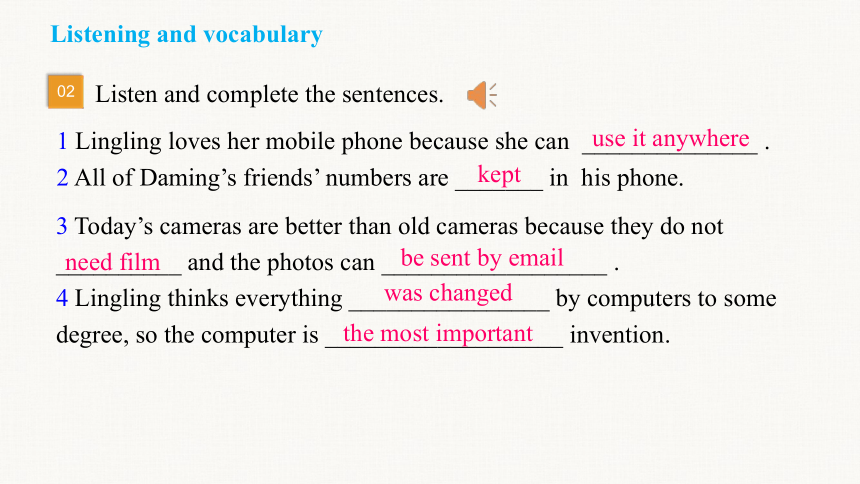
文档简介
(共39张PPT)
Module 9 Great inventions
外研九年级上册 Module 9
Unit 1 Will computers be used more than books in the future
What are the Four Great Inventions of ancient China
compass
gunpowder
printing
papermaking
Warming up
paper
Paper was invented by
Cai Lun. It has been first
made about 2,000 years ago.
It can be written words on
to make a book.
Warming up
the paper-making technique
造纸术
Warming up
Printing was invented by Bi Sheng in the 1040s.
It can be compared with the introduction of the Internet in the 20th century.
(与因特网的引入相媲美)
computer
Warming up
printing
+
books
a newspaper
an ordinary magazine
are
published
paper
Warming up
magazine
Internet
computer
+
+
An online magazine is published on the website(网站).
It isn’t need paper, that’s an important advantage of it.
Warming up
What other great inventions do you know
Warming up
Warming up
Work in pairs. Look at the pictures and answer the questions.
Listening and vocabulary
01
1 How have these inventions changed people’s lives
2 Which one do you think is the most important
3 What other important inventions can you think of
Listening and vocabulary
Listen and complete the sentences.
1 Lingling loves her mobile phone because she can ______________ .
2 All of Daming’s friends’ numbers are _______ in his phone.
use it anywhere
kept
02
Listening and vocabulary
3 Today’s cameras are better than old cameras because they do not __________ and the photos can __________________ .
4 Lingling thinks everything ________________ by computers to some degree, so the computer is ___________________ invention.
need film
be sent by email
was changed
the most important
Tapescript
Daming: What do you think, Betty Which of these inventions is the most important
Betty: It’s difficult to say. They’ve all changed people’s lives.
Lingling: I love my mobile phone because I can use it anywhere. It’s so useful.
Daming: Yes, all my friends’ numbers are kept in my phone, so I don’t need a notebook.
Betty: Today’s cameras are better than old cameras because they don’t need film.
Daming: Yes, and the photos can be sent by email.
Lingling: Well, I think everything was changed by computers to some degree, so I think
the computer is the most important invention.
Daming: I agree. I can’t imagine living without one.
Tony: Dad, can I borrow your camera
Dad : Why
Tony: I’d like to take some photos on the school visit to the museum next week .They’ll be put up on the school website. And they can be seen on the Internet by other classes, even people living in other countries.
Listen and read.
03
Listening and vocabulary
Dad: Sounds great! When I was at school we waited for weeks to hear from
our pen friends abroad. But today, we can send and receive photos and
mails on the Internet, and it’s really fast.
Tony: Yes, the Internet and the computer have changed our lives. We even
use online textbooks in our class. I wonder … Will computers be
used more than books in the future
Listening and vocabulary
Dad: Perhaps. In the past, we mainly got information from paper books.
Some were huge ones with thousands of pages. Today, with the
invention of the computer and electronic technology, it’s easy to get
information on the Internet. The Internet is more powerful than books.
Tony: Anyway, about the camera …
Dad: Oh, yes. Here it is. I haven’t used it since your mum’s birthday. And
the memory card may be full.
Tony: OK. That can be fixed. I’ve got an empty memory card. Where are
the instructions
Listening and vocabulary
Dad: In the camera bag. It’s a gift from your mum for my birthday, so you
must promise that you’ll take good care of it. If you have to lend it to
anyone, tell them to use it properly.
Tony: Promise!
Listening and vocabulary
1. Why does Tony want to borrow the camera
Take some photos.
2. Will his father lend it to him
Yes, he will.
3. What does he say to Tony
He says Tony must take care of the camera.
Answer the following questions.
Listening and vocabulary
1. When Tony’s dad was young, he always waited for a long time to hear
from his pen friends abroad.
2. Tony’s dad thinks paper books are more powerful than the Internet.
3. The instructions of the camera are in the drawer.
T
F
F
True or false
Listening and vocabulary
Now read the summary of the conversation. Underline the wrong information and correct it.
Tony wants to borrow his father’s camera and take some photos of the school dance and the basketball match. The photos will be shown in the school magazine. Tony’s dad lends the camera. He promises Tony to look after it.
website
Tony
his dad
Listening and vocabulary
on the school visit to the museum
Find the sentences in the conversation which mean:
1 Changing the subject, can I get the camera
Anyway, about the camera
2 It is not a problem. I will use another memory card.
3 I will do what you tell me to do.
OK. That can be fixed. I’ve got an empty memory card.
Promise!
04
Listening and vocabulary
Answer the questions.
1 How do you fix a camera if the memory card is full
2 When do you need to read the instructions
3 How often do you send messages by mail
electronic fix instruction invention lend mail page website
If my memory card is full, I will copy some pictures to my computer.
I need to read the instructions before I use a new machine or I meet some problems.
I send messages by mail every day.
05
Listening and vocabulary
4 How many pages does this book have
5 Which website do you often go to when you get online
6 What is an example of electronic technology
This book has 162 pages.
I often go to www. when I get online.
Camera is an example of electronic technology.
7 When you lend something to someone, what do they have to do later
8 What do you think is the most important invention in human history
They should take good care of it before they give it back to me.
I think fire is the most important invention in human history.
Listening and vocabulary
1. Can I borrow your camera
borrow表示借入, borrow sth. from sb. ,
表示向某人借某物。
lend表示借出, 通常是lend sth. to sb. ,
表示把某物借给某人。
I a book from the library yesterday.
昨天我从图书馆借了一本书。
borrowed
Language points
2. They’ll be put up on the school website.
put up 张贴,公布
put down 放下 put off 推迟
put on 穿上;上演 put away 收拾;放妥
You can the notice on the noticeboard.
你可以把通知贴在布告栏上。
put up
Language points
3. OK. That can be fixed. 好的,我来修理它。
fix 修补,修理。
My watch has stopped. It needs fixing.
我的表停了,需要修理了。
辨析:repair, mend与fix
这三个动词都可以用来表示“修理”某一事物,使其能恢复到原来的形状或形态的意思。
1) repair的对象范围很广,从房屋、道路、机器到日常生活必需品,是使受到一定损失或失灵的东西恢复其形状或功能。
Who has repaired the broken leg of the table 谁把桌子的断腿修好了
Language points
2) fix用于需要重新“调整”物体的结构,把松散的部件固定结实,将分离的物体各部分装配起来。在美国口语中,它与repair无太大区别。
Can you fix the broken chair
你能修理那把坏了的椅子吗?
fix指“修理”时,是个非正式的用语,它的基本含义是将某物“固定”在某一地方。 fix可用来指“修补”或“整理”任何出了毛病的东西,使用范围较repair广。
I am going to fix my bicycle tomorrow.
我准备明天修理自行车。
Language points
4. ...we waited for weeks to hear from our pen friends abroad.
收到国外笔友的来信需要好几周的时间。
hear from 收到……的来信;从……听到
I shall defer replying till you hear from home.
我将收到家信以后再给你回复。
I never saw him again, nor did I hear from him.
我再也没有见过他,也没有收到过他的信。
Language points
5. Some were huge ones with thousands of pages.
我们从大量的有着成千上万页的书籍中获取信息。
thousands of 成千上万的
He donated thousands of pounds to charity.
他向慈善事业捐赠数千英镑。
Language points
1) 用单数的场合
当这些词与具体数字连用时, 习惯上用单数,而且其后也不接介词of 。
He was prepared to pay two million. 他愿意支付200万。
More than a hundred people were injured.有一百多人受了伤 。
但是,当这些词后面的名词有了the,these, those等特指限定词修饰时,或其后接的是us, them这样的人称代词时,此时必须用介词of。
About three hundred of them have left there.
他们当中约有300人离开了那儿。
Language points
拓展:hundred,thousand 及 million的具体用法
2) 用复数的场合
当这些词不与具体数字连用,而是表示不确定的泛指概数时,则不仅要用复数,而且要接介词of, 然后才能接名词。
The sun was shining. Thousands of people were lying on the beach.
阳光灿烂,数以千计的人躺在海滩上。
A careless mistake cost the company millions of pounds.
一个粗心的错误使公司蒙受数百万镑的损失。
Language points
分析:一些长的句子需要按照意思的群落(即“意群”)适当断开、稍加停顿(即“停顿”),断开的几部分都具有相对完整的意思。按照一般语法结构,可划分为以下意群单位:
(1)短句 (2) 名词短语 (3) 介词/不定式/分词短语 (4) 动词短语 (5) 主谓结构 (6)动宾结构 (7) 系表结构 (8) 动状结构 (9)主句-从句。
Pronunciation and speaking
Listen and mark the pauses.
Now listen again and repeat.
1 They’ll be put up on the school website. And they can be seen
on the Internet by other classes, even people living in other
countries.
2 You must promise that you’ll take good care of it.
/
/
/
06
Pronunciation and speaking
Work in pairs. Talk about the advantages of these inventions.
— We can use email to send messages.
—Yes, we can use email to send messages quickly and cheaply.
email mobile phone TV washing machine
07
Pronunciation and speaking
— We can use mobile phone to contact others.
— Yes, we can talk with anyone at any time.
— We can use TV to get a lot of information.
— Yes, we can use TV to know what is happening in other places.
— We can use washing machine to wash our clothes.
— Yes, we can easily make our clothes clean.
Pronunciation and speaking
Now describe how these inventions have influenced your life.
Pronunciation and speaking
Email has great influence on my life…
话题:谈论照相机以及电脑和网络对我们的生活的影响。
重点:
1.一般将来时的被动语态的运用;
2. lend、borrow与keep的用法;有关put的词组;辨析repair, mend与fix。
难点:
能够谈论发明创造的优点以及给我们的生活带来的影响。
Summary
Homework
1. Recite the new words.
2. Finish the task in KESHI A JIHUA .
Thanks
Class is over! Bye!
外研九年级上册 Module 9
Module 9 Great inventions
外研九年级上册 Module 9
Unit 1 Will computers be used more than books in the future
What are the Four Great Inventions of ancient China
compass
gunpowder
printing
papermaking
Warming up
paper
Paper was invented by
Cai Lun. It has been first
made about 2,000 years ago.
It can be written words on
to make a book.
Warming up
the paper-making technique
造纸术
Warming up
Printing was invented by Bi Sheng in the 1040s.
It can be compared with the introduction of the Internet in the 20th century.
(与因特网的引入相媲美)
computer
Warming up
printing
+
books
a newspaper
an ordinary magazine
are
published
paper
Warming up
magazine
Internet
computer
+
+
An online magazine is published on the website(网站).
It isn’t need paper, that’s an important advantage of it.
Warming up
What other great inventions do you know
Warming up
Warming up
Work in pairs. Look at the pictures and answer the questions.
Listening and vocabulary
01
1 How have these inventions changed people’s lives
2 Which one do you think is the most important
3 What other important inventions can you think of
Listening and vocabulary
Listen and complete the sentences.
1 Lingling loves her mobile phone because she can ______________ .
2 All of Daming’s friends’ numbers are _______ in his phone.
use it anywhere
kept
02
Listening and vocabulary
3 Today’s cameras are better than old cameras because they do not __________ and the photos can __________________ .
4 Lingling thinks everything ________________ by computers to some degree, so the computer is ___________________ invention.
need film
be sent by email
was changed
the most important
Tapescript
Daming: What do you think, Betty Which of these inventions is the most important
Betty: It’s difficult to say. They’ve all changed people’s lives.
Lingling: I love my mobile phone because I can use it anywhere. It’s so useful.
Daming: Yes, all my friends’ numbers are kept in my phone, so I don’t need a notebook.
Betty: Today’s cameras are better than old cameras because they don’t need film.
Daming: Yes, and the photos can be sent by email.
Lingling: Well, I think everything was changed by computers to some degree, so I think
the computer is the most important invention.
Daming: I agree. I can’t imagine living without one.
Tony: Dad, can I borrow your camera
Dad : Why
Tony: I’d like to take some photos on the school visit to the museum next week .They’ll be put up on the school website. And they can be seen on the Internet by other classes, even people living in other countries.
Listen and read.
03
Listening and vocabulary
Dad: Sounds great! When I was at school we waited for weeks to hear from
our pen friends abroad. But today, we can send and receive photos and
mails on the Internet, and it’s really fast.
Tony: Yes, the Internet and the computer have changed our lives. We even
use online textbooks in our class. I wonder … Will computers be
used more than books in the future
Listening and vocabulary
Dad: Perhaps. In the past, we mainly got information from paper books.
Some were huge ones with thousands of pages. Today, with the
invention of the computer and electronic technology, it’s easy to get
information on the Internet. The Internet is more powerful than books.
Tony: Anyway, about the camera …
Dad: Oh, yes. Here it is. I haven’t used it since your mum’s birthday. And
the memory card may be full.
Tony: OK. That can be fixed. I’ve got an empty memory card. Where are
the instructions
Listening and vocabulary
Dad: In the camera bag. It’s a gift from your mum for my birthday, so you
must promise that you’ll take good care of it. If you have to lend it to
anyone, tell them to use it properly.
Tony: Promise!
Listening and vocabulary
1. Why does Tony want to borrow the camera
Take some photos.
2. Will his father lend it to him
Yes, he will.
3. What does he say to Tony
He says Tony must take care of the camera.
Answer the following questions.
Listening and vocabulary
1. When Tony’s dad was young, he always waited for a long time to hear
from his pen friends abroad.
2. Tony’s dad thinks paper books are more powerful than the Internet.
3. The instructions of the camera are in the drawer.
T
F
F
True or false
Listening and vocabulary
Now read the summary of the conversation. Underline the wrong information and correct it.
Tony wants to borrow his father’s camera and take some photos of the school dance and the basketball match. The photos will be shown in the school magazine. Tony’s dad lends the camera. He promises Tony to look after it.
website
Tony
his dad
Listening and vocabulary
on the school visit to the museum
Find the sentences in the conversation which mean:
1 Changing the subject, can I get the camera
Anyway, about the camera
2 It is not a problem. I will use another memory card.
3 I will do what you tell me to do.
OK. That can be fixed. I’ve got an empty memory card.
Promise!
04
Listening and vocabulary
Answer the questions.
1 How do you fix a camera if the memory card is full
2 When do you need to read the instructions
3 How often do you send messages by mail
electronic fix instruction invention lend mail page website
If my memory card is full, I will copy some pictures to my computer.
I need to read the instructions before I use a new machine or I meet some problems.
I send messages by mail every day.
05
Listening and vocabulary
4 How many pages does this book have
5 Which website do you often go to when you get online
6 What is an example of electronic technology
This book has 162 pages.
I often go to www. when I get online.
Camera is an example of electronic technology.
7 When you lend something to someone, what do they have to do later
8 What do you think is the most important invention in human history
They should take good care of it before they give it back to me.
I think fire is the most important invention in human history.
Listening and vocabulary
1. Can I borrow your camera
borrow表示借入, borrow sth. from sb. ,
表示向某人借某物。
lend表示借出, 通常是lend sth. to sb. ,
表示把某物借给某人。
I a book from the library yesterday.
昨天我从图书馆借了一本书。
borrowed
Language points
2. They’ll be put up on the school website.
put up 张贴,公布
put down 放下 put off 推迟
put on 穿上;上演 put away 收拾;放妥
You can the notice on the noticeboard.
你可以把通知贴在布告栏上。
put up
Language points
3. OK. That can be fixed. 好的,我来修理它。
fix 修补,修理。
My watch has stopped. It needs fixing.
我的表停了,需要修理了。
辨析:repair, mend与fix
这三个动词都可以用来表示“修理”某一事物,使其能恢复到原来的形状或形态的意思。
1) repair的对象范围很广,从房屋、道路、机器到日常生活必需品,是使受到一定损失或失灵的东西恢复其形状或功能。
Who has repaired the broken leg of the table 谁把桌子的断腿修好了
Language points
2) fix用于需要重新“调整”物体的结构,把松散的部件固定结实,将分离的物体各部分装配起来。在美国口语中,它与repair无太大区别。
Can you fix the broken chair
你能修理那把坏了的椅子吗?
fix指“修理”时,是个非正式的用语,它的基本含义是将某物“固定”在某一地方。 fix可用来指“修补”或“整理”任何出了毛病的东西,使用范围较repair广。
I am going to fix my bicycle tomorrow.
我准备明天修理自行车。
Language points
4. ...we waited for weeks to hear from our pen friends abroad.
收到国外笔友的来信需要好几周的时间。
hear from 收到……的来信;从……听到
I shall defer replying till you hear from home.
我将收到家信以后再给你回复。
I never saw him again, nor did I hear from him.
我再也没有见过他,也没有收到过他的信。
Language points
5. Some were huge ones with thousands of pages.
我们从大量的有着成千上万页的书籍中获取信息。
thousands of 成千上万的
He donated thousands of pounds to charity.
他向慈善事业捐赠数千英镑。
Language points
1) 用单数的场合
当这些词与具体数字连用时, 习惯上用单数,而且其后也不接介词of 。
He was prepared to pay two million. 他愿意支付200万。
More than a hundred people were injured.有一百多人受了伤 。
但是,当这些词后面的名词有了the,these, those等特指限定词修饰时,或其后接的是us, them这样的人称代词时,此时必须用介词of。
About three hundred of them have left there.
他们当中约有300人离开了那儿。
Language points
拓展:hundred,thousand 及 million的具体用法
2) 用复数的场合
当这些词不与具体数字连用,而是表示不确定的泛指概数时,则不仅要用复数,而且要接介词of, 然后才能接名词。
The sun was shining. Thousands of people were lying on the beach.
阳光灿烂,数以千计的人躺在海滩上。
A careless mistake cost the company millions of pounds.
一个粗心的错误使公司蒙受数百万镑的损失。
Language points
分析:一些长的句子需要按照意思的群落(即“意群”)适当断开、稍加停顿(即“停顿”),断开的几部分都具有相对完整的意思。按照一般语法结构,可划分为以下意群单位:
(1)短句 (2) 名词短语 (3) 介词/不定式/分词短语 (4) 动词短语 (5) 主谓结构 (6)动宾结构 (7) 系表结构 (8) 动状结构 (9)主句-从句。
Pronunciation and speaking
Listen and mark the pauses.
Now listen again and repeat.
1 They’ll be put up on the school website. And they can be seen
on the Internet by other classes, even people living in other
countries.
2 You must promise that you’ll take good care of it.
/
/
/
06
Pronunciation and speaking
Work in pairs. Talk about the advantages of these inventions.
— We can use email to send messages.
—Yes, we can use email to send messages quickly and cheaply.
email mobile phone TV washing machine
07
Pronunciation and speaking
— We can use mobile phone to contact others.
— Yes, we can talk with anyone at any time.
— We can use TV to get a lot of information.
— Yes, we can use TV to know what is happening in other places.
— We can use washing machine to wash our clothes.
— Yes, we can easily make our clothes clean.
Pronunciation and speaking
Now describe how these inventions have influenced your life.
Pronunciation and speaking
Email has great influence on my life…
话题:谈论照相机以及电脑和网络对我们的生活的影响。
重点:
1.一般将来时的被动语态的运用;
2. lend、borrow与keep的用法;有关put的词组;辨析repair, mend与fix。
难点:
能够谈论发明创造的优点以及给我们的生活带来的影响。
Summary
Homework
1. Recite the new words.
2. Finish the task in KESHI A JIHUA .
Thanks
Class is over! Bye!
外研九年级上册 Module 9
同课章节目录
- Module 1 Wonders of the world
- Unit 1 It's more than 2,000 years old.
- Unit 2 The Grand Canyon was not just big.
- Unit 3 Language in use
- Module 2 Public holidays
- Unit 1 My family always go somewhere interesting a
- Unit 2 We have celebrated the festival since the f
- Unit 3 Language in use
- Module 3 Heroes
- Unit 1 She trained hard,so she became a great play
- Unit 2There were few doctors, so he had to work ve
- Unit 3 Language in use
- Module 4 Home alone
- Unit 1 I can look after myself, although it won’t
- Unit 2 I became so bored with their orders that I
- Unit 3 Language in use
- Module 5 Museums
- Unit 1 Don't cross that rope!
- Unit 2 If you ever go to London, make sure you vis
- Unit 3 Language in use
- Module 6 Problems
- Unit 1 If I start after dinner, I'll finish it be
- Unit 2 If you tell him the truth now, you will sho
- Unit 3 Language in use
- Revision Module A
- Module 7 Great books
- Unit 1 We're still influenced by Confucius's idea
- Unit 2 It is still read and loved.
- Unit 3 Language in use
- Module 8 Sports life
- Unit 1 Daming wasn't chosen for the team last time
- Unit 2 He was invited to competitions around the w
- Unit 3 Language in use
- Module 9 Great inventions
- Unit 1 Will computers be used more than books in t
- Unit 2 Will books be replaced by the Internet?
- Unit 3 Language in use
- Module 10 Australia
- Unit 1 I have some photos that I took in Australia
- Unit 2 The game that they like most is Australian
- Unit 3 Language in use
- Module 11 Photos
- Unit 1 He's the boy who won the photo competition
- Unit 2 The photo which we liked best was taken by
- Unit 3 Language in use
- Module 12 Save our world
- Unit 1 If everyone starts to do something, the wor
- Unit 2 Repeat these three words daily: reduce, reu
- Unit 3 Language in use
- Revision Module B
